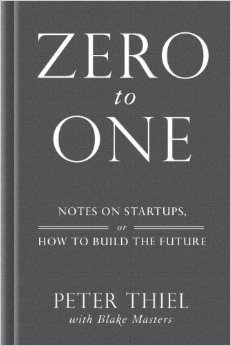““We wanted flying cars, instead we got 140 characters.” The Founders’ Fund
Peter Thiel is probably one of my favorite characters when I think of start-ups and Silicon Valley. Here are just two posts where I mentioned him:
– Technology = Salvation in October 2010
– The promise of technology. Disappointing? in November 2013 (about the great article by George Packer from the New Yorker: No Death, No Taxes – The libertarian futurism of a Silicon Valley billionaire.
And I should not forget short mentions related to The Social Network and PayPal.
An EPFL acquaintance and business angel (thanks Dave :-)) just told me about the course Thiel gave at Stanford in 2012 and the comprehensive notes taken by one of his student, Notes Essays—Peter Thiel’s CS183: Startup—Stanford, Spring 2012. I copied and pasted the notes from this 19-session class, and it makes a 233-page pdf document. Indeed, Thiel will publish this together with his student as a book next summmer: Zero to One: Notes on Startups, or How to Build the Future.
As I did with Mazzucato, I plan to posts a few articles about this piece of work which I find really interesting. His first chapter is about the need for start-ups in innovation and technology, and it motivates the title Zero to One:
“Progress comes in two flavors: horizontal/extensive and vertical/intensive.
– Horizontal or extensive progress basically means copying things that work. In one word, it means simply “globalization.”
– Vertical or intensive progress, by contrast, means doing new things. The single word for this is “technology.”
Intensive progress involves going from 0 to 1 (not simply the 1 to n of globalization).
[…]
Maybe we focus so much on going from 1 to n because that’s easier to do. There’s little doubt that going from 0 to 1 is qualitatively different, and almost always harder, than copying something n times. And even trying to achieve vertical, 0 to 1 progress presents the challenge of exceptionalism; any founder or inventor doing something new must wonder: am I sane? Or am I crazy?
[…]
Teaching vertical progress or innovation is almost a contradiction in terms. Education is fundamentally about going from 1 to n. We observe, imitate, and repeat. Infants do not invent new languages; they learn existing ones. From early on, we learn by copying what has worked before. That is insufficient for startups. At some point you have to go from 0 to 1—you have to do something important and do it right—and that can’t be taught. So case studies about successful businesses are of limited utility.”
Then he addresses “why start-ups?” and “why do a start-up?”
“Size and internal vs. external coordination costs matter a lot. North of 100 people in a company, employees don’t all know each other. Politics become important. Startups are important because they are small; if the size and complexity of a business is something like the square of the number of people in it, then startups are in a unique position to lower interpersonal or internal costs and thus to get stuff done.
[…]
The easiest answer to “why startups?” is negative: because you can’t develop new technology in existing entities. Anyone on a mission tends to want to go from 0 to 1. You can only do that if you’re surrounded by others to want to go from 0 to 1. That happens in startups, not huge companies or government.
[…]
Doing startups for the money is not a great idea. Perhaps doing startups to be remembered or become famous is a better motive. Perhaps not. A better motive still would be a desire to change the world. The U.S. in 1776-79 was a startup of sorts. What were the Founders motivations? There is a large cultural component to the motivation question, too. In Japan, entrepreneurs are seen as reckless risk-takers. The respectable thing to do is become a lifelong employee somewhere. The literary version of this sentiment is “behind every fortune lies a great crime.” Were the Founding Fathers criminals? Are all founders criminals of one sort or another?
More to come soon. But if you like this, just read Thiel!


